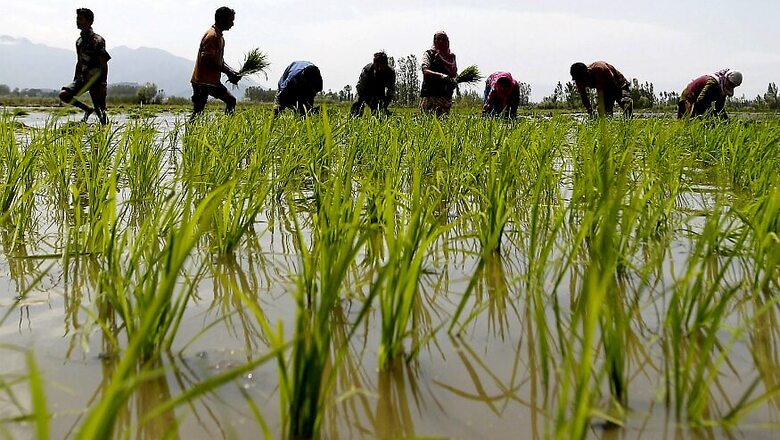
views
Baisakhi is celebrated on April 13 or 14 every year – but this time the festivities around the harvest festival were muted as thousands of farmers across Punjab, Haryana and other states stared at a huge agrarian crisis brought about by the lockdown due to the Covid-19 outbreak.
A good monsoon in 2019 ensured a bumper rabi crop harvest in India this year. But due to the unprecedented outbreak of an unknown virus followed by a stringent nationwide lockdown, millions of tonnes may rot in the fields or go unsold at the mandis.
With a large section of migrant labourers stuck in big cities or back home in their villages and transport facilities mostly suspended, the already burdened Indian farmer is going through a huge agrarian crisis. In addition, farming machinery and equipment including harvesters are in short supply as inter-state movement is highly restricted.
Wheat is India’s main rabi crop and the months from March-May form its harvesting season. India is the world’s second largest producer of wheat. Uttar Pradesh accounts for more than one-third of the crop’s production in India (35%) followed by Punjab (21.5%) and Haryana (13.2%). All these three states rely on a large part of their labour force coming from the eastern states of Bihar and Jharkhand. The wheat has to be weighed in at the mandis and a lot of this work is done by the labourers. But with most of them under a lockdown in their villages back home, the farmers will suffer.
Another major problem faced by some farmers in Punjab is of the scarcity of machines – the harvesters and spare parts. Agriculture comes under essential services and the government has allowed harvesting in the fields by maintaining social distancing. However, the Indian Council of Agricultural Research has advised the farmers to do the harvesting only with machines. Most of the machines are being used for harvesting in states like Madhya Pradesh and Chhattisgarh where the rabi season begins early in February-March. Now farmers are finding it difficult to get the machines back in time with severe restrictions on transportation and movement.
There is also a shortage of gunny bags (used to store the wheat produce) with supply from West Bengal hit due to the lockdown.
“There is no one to help us in the harvesting. Who will plough the machines? Who will put the grains in the bag? We don’t have labour. They are stuck in Bihar. Some are scared to come to the fields due to the virus,” echoed Joginder, a farmer from the north-western part of Haryana.
There has already been a delay of 10-15 days (till April 20) in wheat harvesting in north India. A late harvest in turn means lower yields and lesser returns and a shorter window to plant the next season’s kharif crops.
The story is no different for other rabi crops. In Rajasthan farmers are worried about their barley harvest. They have been using combine harvesters since the last few years as the cost of manual labour is three times higher than the machine. But to procure these machines they need to get clearances and transportation through three states – Punjab, Haryana and finally Rajasthan.
Mahavir works as a part-time cook in Delhi but is traditionally a farmer who grows barley back in Rajasthan. He took leave from his Delhi job just before the lockdown was announced in March and returned to his village in time to prepare for his harvest. But now he faces a double blow. He does not have a harvesting machine for his crop nor is he finding the market to sell whatever produce he could manage with the help of his family. Moreover, he can’t return to Delhi till public transport services re-open. Also his owner won’t take him back till the threat of the virus remains.
“I'm very worried. Neither could I harvest the crops nor sell the produce. And I can't go back either. The job in Delhi is gone too," said a dejected Mahavir.
The situation is no different in Bihar where migrant workers refuse to come out to the fields for fear of catching the virus despite a directive given by the chief minister, Nitish Kumar, allowing labourers to go out as long as they practise social distancing.
In the western interiors of Maharashtra, social distancing is a distant dream for the lakhs of migrant workers who have to cut cane for the sugar factories. It is the only income they get to sustain their family. For them the virus is a secondary threat.
Watermelon harvesting in Telangana in March has been severely hit due to a shortage of labour and trucks to transport the fruit. With not much demand due to panic of spread of the virus, the farmers are forced to sell their produce at extremely low prices.
P Sainath, the founder editor of the People's Archive of Rural India and one of the most sought after intellectuals on the rural economy in India, makes two important points in a piece he wrote for The Wire. “All farmers should grow food crops in the kharif season. If the present trend persists, a terrible food situation looms. They will not be able to sell cash crops they harvest this season. Going in for more cash crops could prove fatal. A vaccine or cure for the coronavirus seems many months away. Meanwhile food stock will dwindle.”
He also advised the Indian government to buy a major part of the farmer’s produce. “Governments must help, pick up and buy big time, the produce of farmers. Many have been unable to complete the rabi harvest – social distancing and lockdowns being in force. Those who have, can’t transport or sell it anywhere.”
Farmers in India already live under a huge burden of loans and the stress of crop failure. Thousands of them commit suicide every year. Covid-19 has only increased their misery exponentially.
Maybe it is time for the administration to treat the situation as an emergency. In the words of India’s first Prime Minister, Jawaharlal Nehru, after the country attained independence in 1947, “Everything else can wait, not agriculture.”




















Comments
0 comment